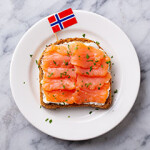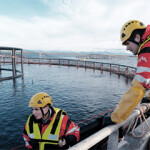Orca Bay Seafoods, Odyssey Foods merge, while Sealaska plans resource acquisitions
Orca Bay Seafoods and Odyssey Foods have announced the creation of a company that will result in the merger of their sales and operations into a single entity. A company representative said the new entity will now seek to maximize the value of Alaska seafood.
Both Orca Bay and Odyssey are based in the Pacific Northwest, and both are owned by larger companies – a majority Odyssey was purchased by Juneau, Alaska-based Sealaska in March 2017, and Orca Bay was owned by Tokosui, which is headquartered in Japan. In an interview, Sealaska Chief Operating Officer Terry Downes told SeafoodSource that under the terms of the agreement, Sealaska, Tokosui and other shareholders will work together to run the company.
Merging the two marketing and value-added processing businesses will result in greater efficiencies and economies of scale and enhance the product mix available to customers, Downes said.
“Our whole vision has been about creating a local conduit to market with a scale that allows us extract more value from Alaska seafood. We are firm believers that we’re not getting enough values for the fish coming out of water,” Downes said. “In a consolidating market, scale is important. We don’t need to be the biggest but we believe that the scale we have now will enable us to create more value for our customers.”
Odyssey and Orca Bay are about 10 miles apart, with Odyssey based in Seattle, Washington and Orca Bay in nearby Renton. Odyssey supplies a multitude of seafood products under its Treasures from the Sea and Chef’s Treasures brands at both supermarkets and restaurants, and provides label frozen seafood to retailers. Odyssey also provides foodservice products, custom processing, and private label production throughout North America from its Seattle-located processing plant, Northwest Seafood Processors. Orca Bay processes both domestic and imported seafood products distributing them to retailers, club stores, broadliners and restaurant chains under Orca Bay, Passport, and assorted private label brands.
While they serve different customers, from a values standpoint, the companies have a lot of common, Downes said.
“The actual leadership of each company is quite similar in ethos and values, especially in our dedication to our people and how we treat them,” Downes said. “We’re firm believers that the path to success happens when people can realize their full potential, and I believe both companies have that leadership style.”
Downes said the move could not be classified as a “traditional” merger.
“This merger is about realizing the potential of the industry,” he said, adding that the new company, which has not yet been named, does not plan on downsizing its workforce, including any of its executive staff. “It’s nontraditional in that sense, and we’re going to take time and do it properly. We’re going to take balanced, medium-term view of the business. We don’t want to make the mistake of losing key people or customers.”
A growing focus of the company, from a marketing perspective, will be “on the key niche resources from Alaska,” Downes said.
“People increasingly care where their food comes from in general and seafood is no exception. They’re also wanting to eat healthier food, and seafood is a great option there,” he said. “We’re going to focus on creating products that are attractive, easy to prepare, and which alleviate any concern the customer may have about the supply chain or what they’re eating.”
Up the supply chain, Sealaska is turning its eyes toward acquiring more access to resources in Alaska, Downes said.
“We have a couple of resource deals in the works,” he said. “We’re particularly interested in cod, groundfish, and any other species that is underrepresented in the U.S. market.”
The goal is to obtain more control over the products’ quality, getting Alaska seafood from boat to consumer as quickly and efficiently as possible, Downes said.
“Alaska is such a unique resource. Products from Alaska almost sell themselves,” he said. “It’s a good value for the money, and it’s a really healthy protein for you and the planet.”
Even so, the new company does not expect to sell Alaska seafood at a premium – at least, not yet. For now, the company is counting on efficiencies and economies of scale to deliver results.
“We’re not naïve enough to base model on premium sales. There are a lot of favorable trends, but whether we can turn into that into premium pricing depends on getting more people to recognize and convert,” Downes said. “But now, we feel like got a pretty good platform to market.”






Share